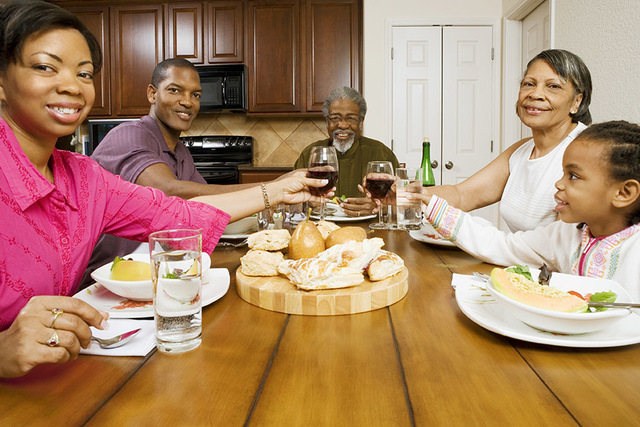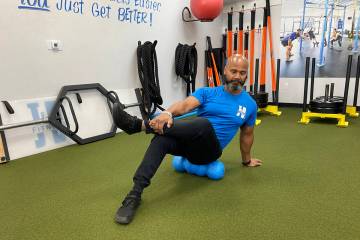Dinner is better when we eat together
When we discuss health benefits of food, we typically speak about what we should eat, what we should not eat; or how to gain understanding of what is within what we are consuming; or how much we should be eating. However, there are far-reaching health benefits with respect to food and our relationship to it—that ranks right up there with all the polyphenols and omega-3s we sink our teeth into – available at our dining tables when we eat with family, friends and peers.
Throughout history, mealtime has been at the center of human culture. At the table, we share stories, build relationships, and learn from each other’s mistakes, creating the bonds that define us, our friends, and our families. And experts agree —along with the prospect of being enjoyable — gathering around a dining table together has far reaching physical and mental health benefits, for all ages.
However, today with the demands of our schedules (long work hours, children’s activities and other responsibilities), it has become more of a lifestyle choice. And also, facts are that it has become more common to eat in front of our computers, the tube, or on the run rather than with others.
Dr. Nina’s What You Need To Know: About Health Benefits of Dining With Others
Chronic Stress
Connecting with family, friends, and peers around the dinner table can be a critical way to help us through the stress of tough times whether you have had a challenging day at work, increasing dynamics with an important relationship, too many demands (with not enough time to do what you really need to do), or perhaps a season filled with loss or chronic illness. It provides a time where we can relax and bond. And while dining together is by no means the only way to combat stress, it has certainly been shown as an important place to focus.
The chronic outpouring of stress hormones can ravage our bodies, and in fact, is a contributor to many of the leading causes of death — heart disease, certain cancers, and Alzheimer’s dementia. Chronic stress can also pack on the pounds and impair our ability to get a good night of sleep. Research shows that table conversation has special qualities that make it different than when we talk on the phone, car pool or engage in meetings and that taking the time to dine with others is a great way to combat the ill-effects of chronic stress.
Our Children
Experts believe that family dining has significant favorable impact on our children and multiple studies have shown that frequent family dining is associated with more complex thinking, higher grades, higher self-esteem, tolerance for opinions, lower rates of teen smoking, drinking, illegal drug use and prescription drug abuse.
Focusing on certain types of conversations, particularly narrative conversation, or the telling of stories, can be particularly helpful with children. Helping them tell stories that include their thoughts and feelings rather than just the facts is associated with greater well-being.
Research shows that children who know a lot about their parents’ own childhood and family histories will become more resilient – able to bounce back from the slings and arrows that life can throw at each of us and better able to learn from challenges, continuing to face issues with optimism.
Our Brain and Memory
Social interaction — staying connected — is one of the most important lifestyle choices we can make, along with being physically active and eating a balanced diet, to decrease our risk for Alzheimer’s Dementia (AD). AD affects over 5 million Americans (this number is expected to triple by 2050) and is the 6th leading cause of death. It has no cure or medication to slow its progression or treat symptoms.
Although researchers are not certain what happens in the brain to produce the positive effects, it appears clear that social interaction has a beneficial impact on memory and cognitive function as people age. Some theories support that as you mature in age, you have more difficulty switching between daydreaming and focused attention to important details. So, the more time the aging brain spends mentally stimulated and socially engaged with family and friends, the less switching is necessary.
What are some tips for planning a meal with family and friends?
- Make a commitment to dine around a table. It is a commitment to your overall physical and mental health, and well-being
- Make preparing meals a group activity when it comes to going to the farmer’s market or grocery store and looking for new, exciting, and healthy recipes, and meal preparation. This provides an opportunity to bond and helps take the pressure off of one person. Additionally, for those with children, it teaches them numerous skills — how to shop for food, make healthy choices, plan, and take on responsibilities — that can have benefits later in their life.
- Plan ahead with friends and loved ones. Consider, for example, the first Thursday (or Wednesday, or Sunday evening) of every month where everyone can break away from their hectic schedule and look forward to eating together.
- Plan a potluck with friends and family. This helps promote communal eating and takes the pressure off of one person
- Make a reservation. Going out for a meal with friends, peers or family allows you to reap all the benefits of communal eating without any of the post-meal clean up (and the associated stress). Just be sure to pick a healthy spot, and be cognizant of portion size.
We recognize that life has changed dramatically in the past 30 years when it comes to eating meals regularly together at a dining table. A complex portrait has emerged of what a “dinner” together means. I’m concerned that given today’s pressures, dinner with family, friends, and peers may become an option — a lifestyle preference rather than a healthy basic social norm. Gathering around a table to enjoy a good meal together is where we entertain new worlds from others present — sharing where we live between bites. And it offers far-reaching health benefits as we face the demands of our days.
Enjoy!!
This article is for general information only and should not be used for the diagnosis or treatment of medical conditions and cannot substitute for the advice from your medical professional. Dr. Nina has used all reasonable care in compiling the current information but it may not apply to you and your symptoms. Always consult your doctor or other health care professional for diagnosis and treatment of medical conditions or questions.




























